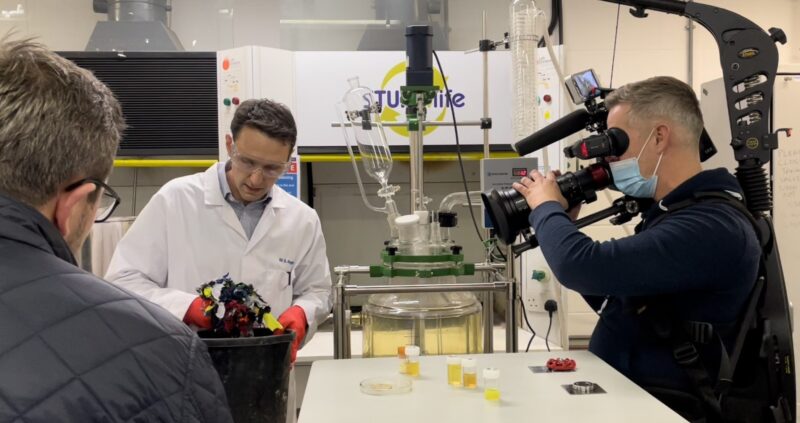Recycling
Funding given to support research and development of innovative recycling solution trial
Safety products and services company, Arco, has committed seed funding to partner with start-up company Stuff4Life to support the research and development of a closed-loop, circular economy solution for polyester workwear.

Dr David Hughes, Teeside University, and James Davies, Arco, during a visit to the lab
Nearly 90% of the 33 million workwear garments supplied annually end up in landfills or are incinerated. Many of these items are made from polyester, a plastic based fabric and industry staple that uses an estimated 342 million barrels of oil every year to make. With a limited product lifetime and little to no infrastructure for recycling and manufacturing in the UK, workwear has a high social and environmental impact.
Arco’s funding will enable Stuff4Life to commission a chemical recycling demonstration plant in collaboration with Teesside University, bringing onboard its academic experts, research capabilities and facilities.
The plant will recover the base compound terephthalic acid (TPA), used in the production of polyester fabric, from recycled workwear. The recovered TPA will then be reincorporated into various manufacturing processes, with the goal being to manufacture new polyester to deliver a “PPE for Life” opportunity in the UK.
As part of the trial phase, Arco and Stuff4Life will collect, shred and transport up to six tonnes of end-of-line polyester, and polyester mix, garments. The garments will then be recycled using chemical processes. Several batches of garments with different levels of polyester content will be put through the process and the result analysed, including the TPA quality.
If the initiative is successful, Arco and Stuff4Life will be able to support a circular economy for workwear. This would see the TPA created through the chemical recycling activity sold back into the virgin polyester manufacturing process, with volumes externally audited and validated.
Successfully recycling polyester and establishing an onshore UK supply chain would reduce the industry’s dependency on fossil fuels and find value in waste. It will also significantly reduce pollution from the manufacturing process as recycled polyester uses 59% less energy compared to virgin polyester. If successful, this will significantly help tackle the world’s climate crisis.
John Twitchen, Director of Stuff4Life, commented: “The humble hi-vis is an essential item for everyone working in hazardous environments, from mending roads and collecting bins to saving people at sea or up mountains.
“The impact of polyester as a linear make-use-dispose garment is significant, but by recycling it, those impacts can be substantially reduced whilst keeping all the performance benefits from using synthetic fibres.”
Dr David Hughes, Associate Professor in Teesside University’s School of Computing, Engineering and Digital Technologies, concluded: “Polymers no doubt have a hugely important role in the future of energy, resources, food, health and infrastructure. However, we need to decouple from a use-and-dispose economy to a circular, sustainable one. We are hugely proud to be working to make a real difference to the future of polymer sustainability.”
Funding given to support research and development of innovative recycling solution trial
Arco has committed seed funding to partner with Stuff4Life to support the research and development of a circular economy solution for polyester workwear.
Safety & Health Practitioner
SHP - Health and Safety News, Legislation, PPE, CPD and Resources Related Topics
Future-proofing safety: Five trends shaping the PPE landscape of tomorrow
Understanding the relationship between the key sustainability principles
Arco backs SHP campaign for PPE inclusivity

